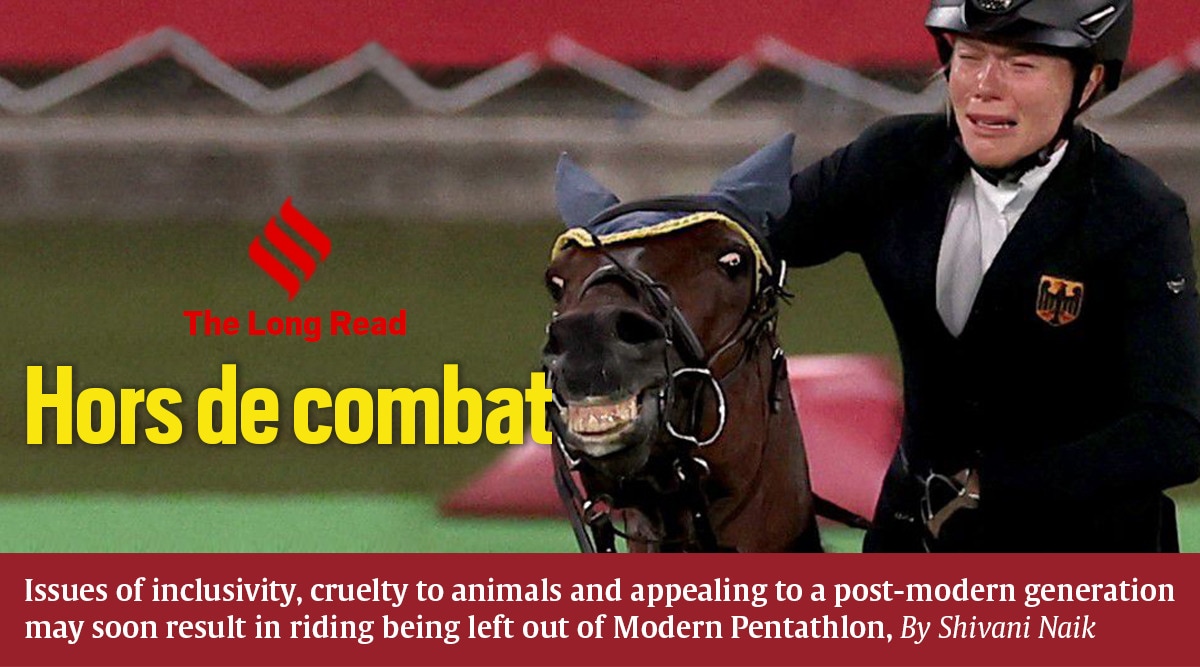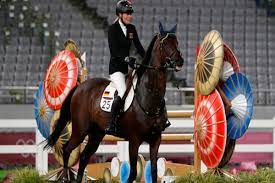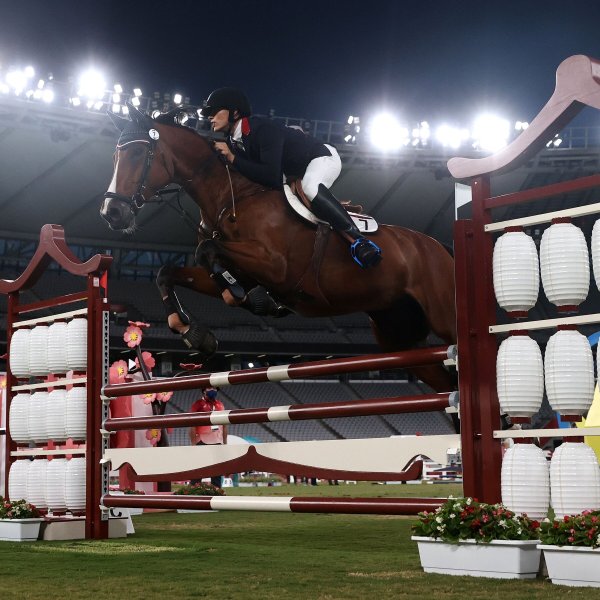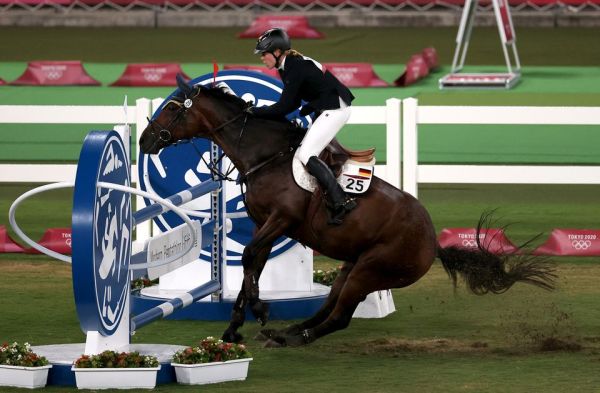
Maybe finding a communication network for frequencies on walkie-talkies in the wilderness (though not looking silly like in Pokemon), while running cross-country with portable repeaters, could be fashioned into two-fifths of a post-modern pentathlon. Since soldiers escaping from behind enemy lines to deliver important messages by grabbing the first equine with pricked ears seems antiquated communication and commuting, even as a gallant literal riffing of old times.
Cavalries around the world are ceremonial now, restricted to parades. The chargers of the light brigade are replaced by tanks. Somewhere in the robot-tech bowels of Boston, stick-mules on batteries are being created to ferry heavy supplies in combat zones, showcased to look cute, dancing to BeeGees, in advance. The very premise of horses in a warzone – an ode to which was the modern pentathlon combining show-jumping with swimming, fencing, shooting and running – has been archaic. Baron Pierre de Coubertin, who patched together this bespoke Olympic sport, was himself giving in to romantic martial nostalgia of knights fleeing enemies. What started as a throwback in the first place is fast fading in sepia too.
The disbanding of ancient cavalries led to military dressage and show-jumping finding their way into international sport, on neatly raked sand. Even that was 109 years ago, when the Swedes at the Stockholm Games aggravated the Baron’s annoyance by asking everyone to ‘bring your own horse’ (BYOH). But the horse question has been ticklish for a few decades now in its century-old history, with the sport’s governing body, the International Modern Pentathlon Union (UIPM), having set up an Innovation Commission around the Rio Games to contemplate what could be done about the horses.
 Annika Schleu of Germany cries after she couldn’t control her horse to compete in the equestrian portion of the women’s modern pentathlon at the 2020 Summer Olympics, in Tokyo, Japan, on Aug. 6, 2021. (AP Photo/Hassan Ammar, File)
Annika Schleu of Germany cries after she couldn’t control her horse to compete in the equestrian portion of the women’s modern pentathlon at the 2020 Summer Olympics, in Tokyo, Japan, on Aug. 6, 2021. (AP Photo/Hassan Ammar, File) While the Innovation Commission was innovating, a German coach struck a glum horse, who felt more neigh than aye and refused to jump for his rider at the Tokyo Games. The short clip of the cruel hit on Saint Boy, seen by the greater world, precipitated an internal decision in UIPM to drop riding from the sport. If the buzz inside UIPM is to be believed, the decision had been inevitable, with the only question remaining on which sport would replace riding.
Forty-six top names in pentathlon have since written to IOC to keep the horses in the sport, alleging that removing one of the five disciplines cannot be bulldozed by merely amending the “competition rules” of October 31, but will require deliberations on the 100+ year-old statutes. They also pleaded to IOC’s sense of tradition and history in preserving the fundamentals of the founder’s sport. The IOC, meanwhile, has embarked on its path to engage with the youth, and include accessible sports that can hook an evolving trendy demographic.
Even the current set of pentathletes believe that animal welfare needs to be at the core of any reform – forcing a reluctant horse to jump, merely for sport and competition, is too brutish for anyone riding in 2021.
 Joseph Choong of Britain, the gold medalist in the Olympic modern pentathlon, which is dropping its equestrian segment. (NYT)
Joseph Choong of Britain, the gold medalist in the Olympic modern pentathlon, which is dropping its equestrian segment. (NYT) “As the past two decades have proven, we are all ready to adopt changes in the competition rules in order to modernise our sport and make it more possible and accessible,” the letter written by the 46, read. “Nevertheless, we are deeply convinced that leaving out riding will not solve any of the common reservations about modern pentathlon. Instead, it will create additional challenges and ruin years of hard work for hundreds of athletes. Our equestrian discipline is a fundamental foundation of our sport – to be the ideal athlete – is to be preserved.”
Pentathlon isn’t shy to change. A few Olympic cycles ago, it welcomed laser-runs, replacing air-pistol target shooting with 20 hits or 3-minute-40-second laser load&shoot & 800mx4 cross-country. As such, what used to be a 5-day event, in which fencing went on for 14 hours, became a single-day competition in 1996 and will be crunched into 90 minutes at Paris.
While Olympic hosts themselves had parried away Coubertin’s efforts to lug in rowing into the modern pentathlon programme at the outset, an entire team event was packed off, to finally make way for a women’s competition.
The ancient Greek pentathlon was built around wrestling, javelin, discus, long jump and running, till Coubertin went looking for his parable to the cavalry, and trotted in the horses.
There had been reports after the Executive Board voted out riding that cycling would be included instead, but the UIPM according to a November 5 report in CNN said that wasn’t the case. The newly-introduced sport-climbing was an option, again with an eye on the yuppie demographic that has seen more paintball than cavalries blitzing in.
Sport riding & horse welfare not incongruous
Joe Choong, the reigning Olympic champion in men’s modern pentathlon, started out as a national-level swimmer in Britain, and dabbled in rugby and cross-country for fitness. Riding was the last of the five he learnt, and even suffered a fall when a moody horse threw him off in his first competition. “Riding, I found the hardest to pick. It took some time to realise that you can’t be thinking about yourself, but must think of the animal. The reward was in striking that balance with someone else, and it gave me another sense of achievement,” Choong tells The Sunday Express.
 Joe Choong, the reigning Olympic champion in men’s modern pentathlon.
Joe Choong, the reigning Olympic champion in men’s modern pentathlon. Talent scouts came calling for pentathlon, since it’s rare to find athletes who swim and run, he says. Usually, swimming sets the tone – and fencing and shooting are added, at youth levels.
He is miffed with UIPM for unilaterally dropping a fifth of history, while blindsiding those at the centre of the sport – athletes. “I’m angry, disappointed and disagree with the idea. They didn’t speak to anyone from the athletes’ federation. We knew and agreed that there were problems after Tokyo with the ride, and were ready to propose new ideas to improve the sport.”
The Olympic gold medallist from Bromley watched most of the women’s event and was heartbroken to watch it unfold, also with rising anxiety at what this implied. “It was not nice to watch, very difficult for both the horse and the athlete. (Annika Schleu was in tears),” he recalls, adding the height of jumping fences has been a persistent problem, with Tokyo only erupting after years of neglect from the federation.
“It’s been happening for more than 10 years or more. In fact, if you speak to athletes even from Sydney and Athens (Olympics), they’ll tell you the same issues persist with the ride,” Choong says. The nuance – though a big blight it casts – is in the height of the jumps, a newly-acquainted horse is expected to jump with an unfamiliar rider, after just 20 minutes of bonding.
“Even at the Pan Am Games, horses used to jumping 90 cm or unschooled in show-jumping are asked to go over 120. That’s always a disaster. I don’t come from a riding background but we have a fantastic set-up in the UK. But I can imagine how difficult it can be for those not coming from countries with that training. Twenty-minute preps and then a 120 cm jump is not at all easy. Changing the height to 1metre might be the simple solution,” he says.
Shocked, upset and with a foreboding of inevitability, Choong has drowned himself into efforts to save something he believes is fundamental to the sport. He, however, doesn’t think bringing one’s own horse is the solution. “No, history says that you have to establish a bond with an unknown animal. I see the ability to form a bond with an animal as technical. Horses bring diversity to our sport and link up the tale of the cavalryman. Without riding, it would be just a weird mix of sports. At the heart of Coubertin’s thinking was history – find the first horse you can – stolen from the enemy, not your horse. You meet them just minutes before, strike the bond and live the image of the cavalry soldier. Also, if you ask everyone to bring their own horse, that’ll make it elitist and limit accessibility to newer countries,” he stresses.
Thirty-six riders share 18 horses at the Olympics. Pentathlon can get expensive. And for two medals, the investment, which can run up to 1.5 crore INR a year in training, is wildly exorbitant. To master the 12 hurdles can cost one 25 lakh INR at a riding school in Egypt.
Other issues with governance in the sport include smaller tournaments, which make do with a tetrathlon, omitting riding up to the semifinals. “Then you hope you get a really good horse. But that sends the wrong message out that you are only concerned about four participants,” he says. It effectively deprives the rest of the field of what can go awfully wrong at the Olympics: a sullen equine, refusing to jump.
It is expected that beyond the dozen nations, the European traditional powerhouses and Australia, others will vote out riding, hoping to make the sport as compact and relevant as possible. Minus the ride, newer nations might well benefit, while medal gluttons US and China tend to accept rules and get on with sharpening those skills. Pentathletes worry that the sword hangs over fencing next.
Joe’s younger brother Henry, 15, is entering the sport under this cloud of uncertainty, and while he himself straddled both the pellets (2-3 years) and laser years – finding laser easier because of the smaller recoil – he says animal welfare needed to be at the heart of riding.
“There are many small things. Tokyo temperatures were 35 degrees, you need to feed water to them because they got thirsty. Don’t force them to jump if they refuse and are under stress. Make them as comfortable as possible, use as little as possible of whips, spins. It’s not just ‘get on the horse and finish round’. Not patting it, forgetting to congratulate it is not okay. It needs the well done and the pat,” he says.
Paris swansong?
It will perhaps be lamentably poetic if Paris 2024 sees the last of horses in a modern pentathlon. Paris and Versailles were decadent centres of the renaissance royal carrousel – an ornate military drill for King Louis XIV, with their expansive earmarked horse-training areas. The French Revolution and the preceding years scythed into the pomp of the royals, and Napoleon’s wars finished the Versailles school of classical riding.
 Modern Pentathlon – Women’s Riding – Tokyo Stadium – Tokyo, Japan – August 6, 2021. Annika Schleu of Germany in action REUTERS/Ivan Alvarado/File Photo
Modern Pentathlon – Women’s Riding – Tokyo Stadium – Tokyo, Japan – August 6, 2021. Annika Schleu of Germany in action REUTERS/Ivan Alvarado/File Photo In her evocative tome tracing equestrian history, The Age of the Horse, author Susanna Forrest, writes movingly of the Petite Ecurie, the courtyard of stables, once oozing splendour and then shut down by Louis XIV to cut royal expenses. Paris also hosted hippodromes – theatres of chariot races. The beasts and the beautiful riding skills then moved into the able hands of Philip Astley, who began the modern circus and Cirque Olympique of Antonio Franconi.
Horses were the throbbing pulse of imperial Europe with haute ecole academies – schools of stylised military classical riding and advanced dressage – competing on styles in
Paris, Vienna, Saumur, Jerez and Lisbon, as knights turned to cavalrymen. Ecuyers (royal riders at Versailles) held their prominence.
Amongst the most famous of the French riders was Antoine de Pluvinell (1555-1620), who saw horses as intelligent beings, and preached teaching them with gentleness and kindness. “Pluvinell turned dressage into a metaphor for statesmanship,” Forrest writes.
History of man and horse cantered around Parisian boulevards, Forrest muses, talking of a butcher’s son from Versailles, Francois Baucher taking on a “challenge to gentle a horse called Gericault who had a savage reputation across Paris, turning him into a docile stallion, tamed, collected and obliging to an audience of gratified fans and furious critics.”
Rassemblage – a horse cantering backwards – would attract large numbers at circuses and riding shows, as piafes, gallops, pirouette, leaps and side-straddles acquired connoisseurs.
However, it is the world-renowned rider and choreographer Bartabas whose circus Zingaro brought in an artistic sensibility to haute ecole, the military drill. He elevated the horse to a co-artist putting up shows including at London’s dance venue Sadler’s Wells. “In the reverse of Pluvinell’s ‘bringing the horse to reason’, Bartabas preaches submission to the horse, living by his needs, his rhythms and taking cues for training from him,” Forrest writes. Mazeppa – a 1993 film depicting Bartabas, won a technical grand Prix at Cannes and Hermes made a saddle for him, the horse tradition nicely flowing into contemporary fashion and art.
What the rest of the world finds antiquated about horses in Europe isn’t the easiest to wrench off their culture. “This life we love, runs against all the values of today,” Barbatos wrote on his manifesto, a book on paradoxes and sacrifices of working with horses. He’d also advocate more femininity in riding, because it meant not dominating the horse, Forrest writes.
His riders spend days in silence, communing, instinctively with the equines. An ecuyer named Manu tells Forrest: “You don’t respect the horse enough because you go too fast. Here we listen to the horses, you take the time to teach them, to change their ideas, to work with them. It’s much closer to culte of the cheval (French for horse),” while asking ironically, “You like sport, eh?”
That the modern pentathlon (and equestrian) has a problem is no secret, and Paris might well see another traditional horse showpiece go down after the Hippodrome impresarios and carousel choreographers went out of vogue.
But it is in the words of Portuguese equestrian and trainer Nuno Oliveira that the equinox splits: “Equestrian is a school of abnegation and humility. It makes men better. Do not seek public success and self-satisfaction after the applause, but instead the dialogue with the horse.” The modern pentathlon at the Olympics might find that a bit whinny to straddle with its competitive compact ambitions.
- The Indian Express website has been rated GREEN for its credibility and trustworthiness by Newsguard, a global service that rates news sources for their journalistic standards.

